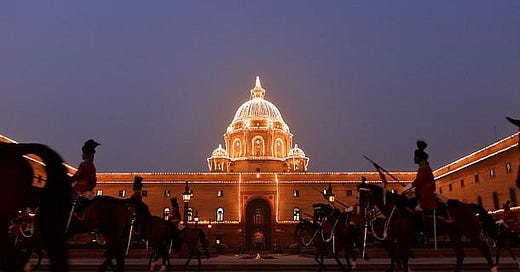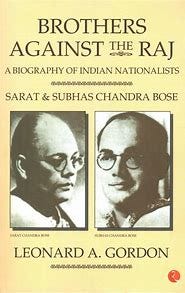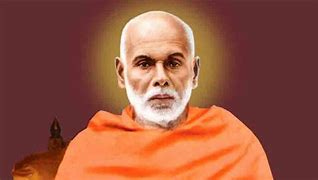A version of this essay has been published by swarajayamag.com at https://swarajyamag.com/culture/the-argument-about-a-british-hymn-at-beating-the-retreat-well-heres-an-alternative
I personally have had no idea what ‘Beating the Retreat’ is all about, so I was startled when a full-scale war of words erupted because the Government of India apparently decided to replace a British-era song called ‘Abide with me’ with a Lata Mangeshkar song named ‘Ae mere watan ke logon’ as part of the ceremony.
Upon reading the now-famous ‘Abide with me’, which I had never heard of, and looking it up on the Internet, I found out it is a Christian hymn, written by some unknown British padre in the 1850s. Insofar as its literary quality goes, it is not bad, and appears to be a plea for having the Christian God stand with the beseecher as he goes through his times of trouble. It is clearly directed to the Christian God because it includes verses about the cross.
It is not entirely clear why removing this uni-denominational prayer is a blow to tradition, such as it is. That too a colonial tradition imposed on a prone India in the 1900s.
On the other hand, I have read that Nehru himself cried when listening to ‘Ae mere watan ke logon’ in the aftermath of the 1962 debacle. I have my doubts about that song’s appeal because of its over-reliance on words of Farsi and Arabic origin, which sound alien to my southern ears. When I first heard it, I confused the word ‘watan’ (Arabic for country) with ‘vadan(am)’ (Sanskrit for face), but of course it didn’t make any sense.
Interestingly, I found out on twitter that ‘Abide with me’ was Gandhi’s favorite hymn! This was on the authority of Shashi Tharoor, Congress MP, on January 26th. He didn’t elaborate as to how it is known that it was Gandhi’s favorite hymn, which I had been earlier led to believe was ‘Vaishnava Janato’.
Going one step further, another Congress MP, P Chidambaram, let on that it was also Subhas Bose’s favorite hymn. How did he know that? Why, Bose’s grand-nephew Sugata Bose told him. Sugata Bose is a professor at Harvard University; it is probably not necessary to remind people, as per Wikipedia, that “Harvard College was founded in 1636 as a Puritan/Congregationalist institution and trained ministers for many years.”
I guess that would have been clinching evidence for the importance of ‘Abide with me’, except for a small detail: Sugata was born in 1956, 11 years after Netaji disappeared in 1945. So how on earth did he witness the “tears flowing down Netaji’s cheeks”? So it is just a second-hand tale of dubious authenticity?
Remarkable that this obscure prayer was the favorite of not only Gandhi, but also Netaji! And I don’t know about you, but all these tears from the stalwarts of the freedom movement are beginning to make me feel a little queasy.
In other words, all this sounds like a red herring, if not proper fake news manufactured on the spot. The real issue is that the Congress is upset that Narendra Modi has recognized the enduring affection that average Indians have for Bose. Congress’ diligent attempts to obscure Bose’s contribution, along with that of other stalwarts like Patel, worked for a long time, but as they say, you can fool all the people some of the time, but not all of the time.
Personally, I used to hero-worship Bose, and even attempted to read the monumental Brothers Against the Raj, but later I found that he had certain blind spots about leftism for example, and he had rather absurd ideas about abandoning Indian scripts for Roman, so I now have a more nuanced view. But he clearly deserves, as the head of the Indian National Army, the signal honor of a commanding statue at the India Gate.
And in case the nation is in the market for a purely non-sectarian hymn that deserves to be accepted as a national prayer, I have one in mind. It is the Daiva-dasakam or Ten Couplets to the Almighty by Sri Narayana Guru. Here’s my translation from the Malayalam original:
O Almighty, watch over us
Without abandon
Thou art our Captain
In the mighty ship of Life
On the sea of Existence.
Counting one by one
And when all Essences are counted
The seeing Eye alone is left
Let that inner Self thus rest in Thee.
Thou alone art our Lord
Thou Who without fail
Bless us with food and clothes and everything else.
As the ocean holds deeps, waves, and storms,
Let us hold within ourselves the Manifest World,
Thy Glory and Thou.
Thou art the Act of Creation, the Creator
And the innumerable creatures Thou hast created.
O Almighty, Thou art also the very material of Creation.
Thou art the Material World,
Its Creator, and its Enjoyer too,
And the Noble One that grants Salvation by lifting Illusion.
Thou art Truth, Knowledge and Bliss,
The Present, the Past and the Future too are None else.
Verily art Thou the Spoken Word, too.
Thy Self, in Glory ensconced
Both inside and outside us
We forever worship
O Almighty, Thy Will be done.
Victory to Thee, Grand One,
Refuge of the weak.
Victory to Thee, Abode of Joy,
Ocean of Mercy, Hail.
Into that profound sea of Thy Glory
Let us all plunge,
And flourish forever
Flourish in Happiness
Flourish.

















Share this post